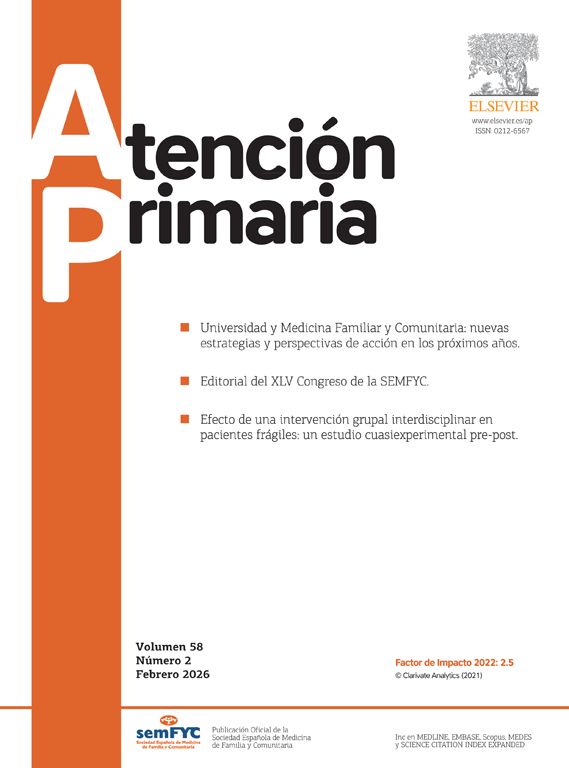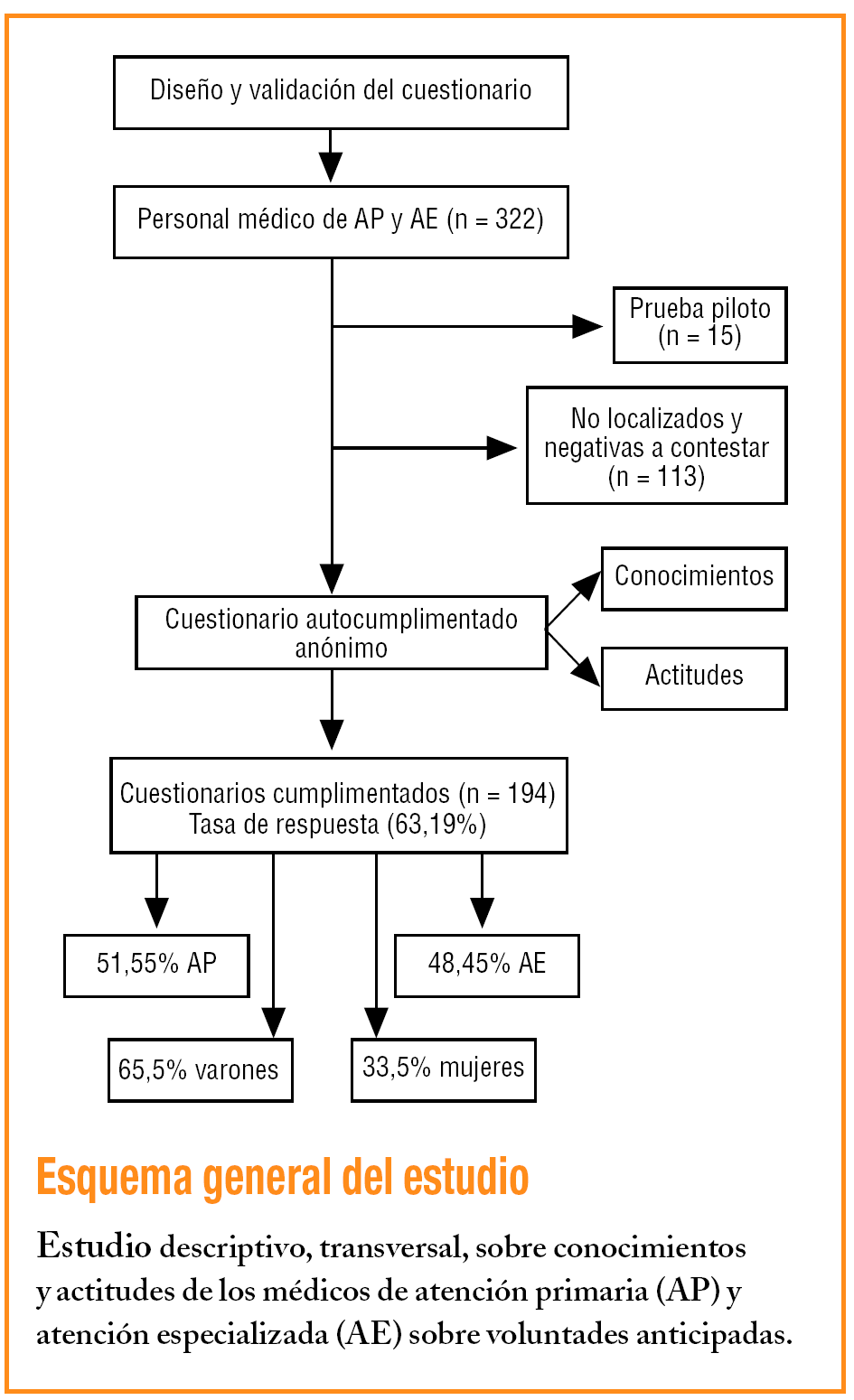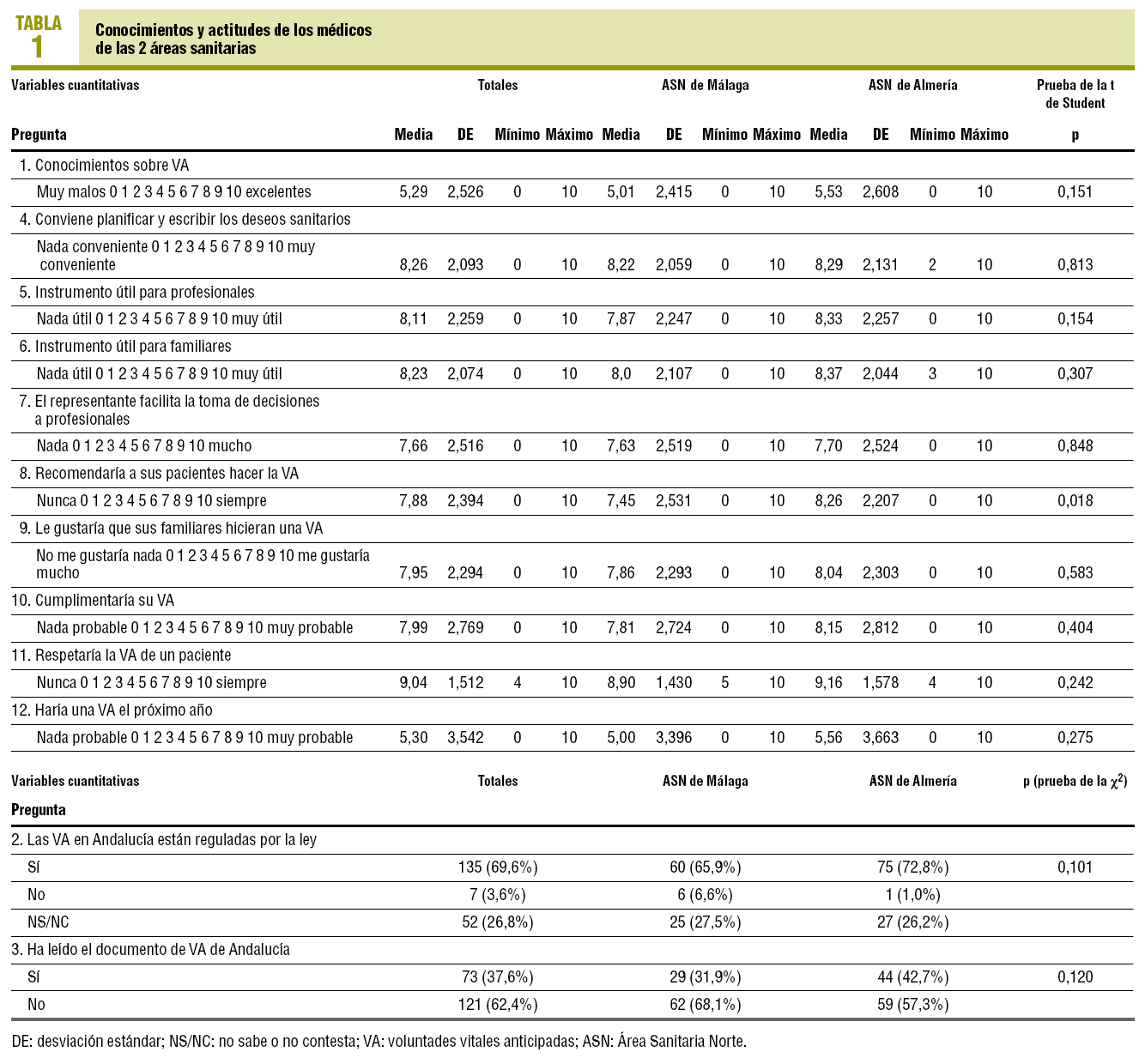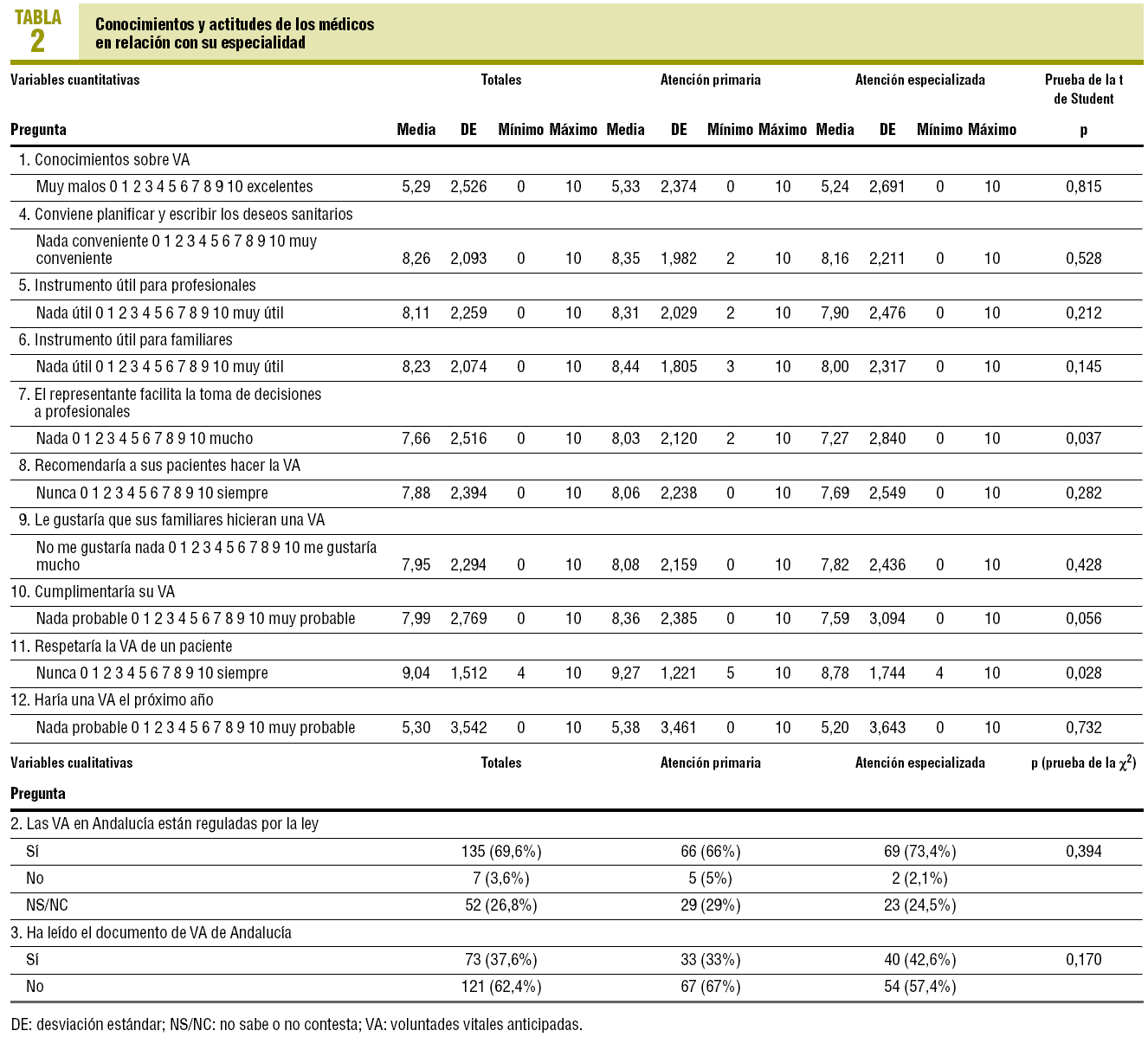*The investigators of the project "In the end, you decide" are presented at the end of the article.
Introduction
Attempts are being made to improve the health care of the population with the use of advance health care directives.
Advance health care directives or previous instructions are documents which enable a person to state the health treatments that they wish to receive if the time comes to make decisions when they may be physically or psychologically unable to make them for themselves. These documents are also known as living wills. This citizen right also helps health professionals to make better decisions for the patient in clinical situations where they cannot express their wishes.
According to the data compiled in the Autonomous Community Registers up to June 2007, 36 289 people in Spain have made their advance directive since the laws1 that regulate advance directives came into force in our country.
However, the making of decisions at the end of life should not be limited to the simple signing of a document. This process must be thought through, reflected upon and informed, and be part of an integrated process of participation called "advance decision planning."2-6
The creation of living wills and their corresponding registers arose so that doctors might communicate in a permanent way, making use of a general guideline or rule in which to take refuge.7 However, if health professionals do not have the knowledge and the attitude required to work with this tool, living wills and the advance planning process will be in danger of not being used correctly.
In general, there is not very much in the literature on the subject of living wills in Spain,8-11 and what there is, is mainly theoretical.12-16 There have been few studies carried out in our country on the knowledge and attitudes of the population17 or health professionals on living wills and advance planning in general.
The objective of the present study is to examine the knowledge and attitudes of the medical staff of the North Malaga and North Almeria Health Areas.
Methods
Design
A descriptive, cross-sectional study was performed in primary and specialized care by means of a questionnaire, in the North Malaga and North Almeria Health Areas.
Study Population
The total population was made up of 322 primary and specialized care doctors from both areas. To comply with the inclusion criteria, the professionals surveyed had to be family doctors in primary care or specialized care physicians in internal medicine, traumatology, mental health, rehabilitation and preventive medicine. Of these 322 professionals, 15 participated in the questionnaire pilot study. It was not considered appropriate to carry out sampling due to the population size, so the final study population was made up of a total of 307 doctors.
Questionnaire
A self-administered anonymous questionnaire was used, designed and validated by the research team to achieve the objectives of this study. This questionnaire examines the sociodemographic variables (age, sex, and care level), as well as the knowledge and attitudes of the doctors on living wills. The first 3 items of the questionnaire examine the knowledge of the doctors on living wills, while the following 9 items examine the attitudes of these professionals towards these documents.
The questionnaire is composed of dichotomic variables and a Likert type scale (0-10).
The design and validation of the questionnaires guarantees its validity and reliability, since it was submitted to an expert panel, a judges test and a test-retest reliability test. Finally, a pilot test was carried out with 15 participants.
The complete questionnaire, available on the Internet, is shown in Appendix 1.
Methods
This study was carried out within the framework of a wider project called "In the end, you decide," approved and authorised by the Andalusia School of Public Health Research Committee of Granada.
In primary care, a member of the link nursing staff was responsible for the distribution and collection of the questionnaires, whilst in specialized care it was the social worker of each hospital who was responsible for carrying out this task.
The verbal consent of the participants was sought before handing out the questionnaire. The origin of the study was explained and confidentiality and anonymity of the data were guaranteed. This information was also given in writing as an attachment to the questionnaire.
The survey was carried out between December 2005 and January 2006.
Data Analysis
The data obtained were analysed with the program SPSS for Windows version 14.0. The descriptive results of the 2 health areas are shown and the responses of the medical staff of both areas are compared using the *2 test or the Student t test.
Results
The total number of doctors who responded to the questionnaire was 194 (63.19%), with a mean age of 42.54±80.85 and a range of 25-63. Of those surveyed, 65.5% were males and 33.5% female. There were 51.55% primary care doctors and 48.45% from specialized care. The reasons why some doctors did not complete the questionnaire were either due to their refusal to respond or because it was not possible due to their situation (sick, holidays...).
The data which describe and compare the knowledge and attitudes of the doctors of both health areas are shown in Table 1.
No significant statistical differences were found between the 2 areas, except in item number 8.
Table 2 shows the data obtained for primary care and specialized staff. Differences were found in items 7 and 11 where the attitude of primary care medical staff is significantly more positive towards living wills than specialized care is. Differences were found in the significance limits in item 10.
Discussion
Firstly some considerations have to be made on the nature of the methodology which, to a greater or lesser extent, could affect the validity of the data. The difficulty in extending the results obtained to a general medical population needs to be pointed out. Similarly possible selection biases produced during the data collection process or to the limitations that could be derived from the validation of the questionnaire, should also be considered.
In general, we can deduce from the results obtained that knowledge of advance directives by medical staff could be much better. These professionals self-scored their knowledge with 5.29. That they are regulated by law was known by 69.6% and only 37.6% say that they have read the Andalusian Advance Directive document.
As regards the attitudes of the doctors about advance directives, in general, they revealed a positive attitude towards these documents.
It is worth mentioning the great contradiction found between the theoretical readiness and the real possibilities of complying with an advanced directive.
In our country, there are few studies that have examined the knowledge and attitudes of doctors towards advance directives and towards advance planning in general.
The study by Bachiller et al18 showed that only 10.8% of doctors surveyed knew the legislation on advance directives in detail, 9.8% had detailed knowledge of the existence of advance directives in other autonomous communities. That all patients must be informed on the existence of this document was expressed by 98.2% and 31.5% had no reservation in applying the will of the patient. Santos de Unamuno et al19 polled 169 family doctors and found that 82.5% of those surveyed considered their knowledge on advance directives to be limited or zero. Only 11.8% had read the current legislation, and 97% were in agreement that advance directives could help in decision making.
In Canada, Hughes et al20 found that family doctors were supporters of advance directives, but they used them very infrequently. The majority of these professionals were of the opinion that education programs about these were needed.
Other surveys carried out on family doctors in Finland21 and Australia22 are also in agreement with our study on the positive attitude of these professionals towards advance directives and in the need to improve their knowledge on the legislation and its use.
The previously mentioned facts demonstrate the need to establish training programs on advance directives and advance planning in general, which would enable doctors to use a tool which, if used correctly, could benefit both the users and the professionals of our health system.
It also must be pointed out that to establish suitable and effective programs, it would be of great importance to develop new lines of research aimed at determining which programs would be most suitable for training and educating our professionals. In the international scene, studies have been carried out23-25 with the aim of identifying the effectiveness of different education programs to improve the knowledge, attitudes and skills of doctors as regards advance directives. To develop projects of this nature in Spain would involve a great leap forward for research into advance planning and the end of life, enabling the health system to provide suitable programs to suit the needs of doctors.
Acknowledgements
To the medical staff of the North Malaga and North Almeria Health Areas for filling in the questionnaire, to the nursing staff and social workers of these areas who helped collect the data, and Ricardo Ocaña (Professor of Statistics EASP) for the help requested during the statistical analysis.
Investigators of the "In the end, you decide" project
Pablo Simón-Lorda (principal investigator), María Isabel Tamayo-Velázquez, Belén Álvarez-Fernández, Inés María Barrio-Cantalejo, Ángel Benítez-Moyano, Manuel Bernal-Páez, Alberto Durán-Hoyos, Miguel Ángel García-Ordóñez, Susana González-Portillo, María José González-Rubio, Esperanza Jiménez-Luque, Francisco Javier Júdez-Gutiérrez, Juan Luque-Alba, Teresa Montero-Alba, Julián Moreno-González, Jesús María Pena-González, Isabel Pérez Amores, María del Mar Pérez-Hidalgo, Natividad Recio-Recio, María Auxiliadora Reyes-Burgos, María del Carmen Rodríguez-González, Pilar Ruiz-Díaz, and Alejandro Vázquez Vicente.
A preliminary version of some of the results shown in this article was presented at the XXIV Congress of the Spanish Health Care Society (SECA), Toledo, 2006, as a presentation entitled "Survey of
health professionals on knowledge and attitudes to advance directives," and at the XXVI Congress of the Spanish Society of Family and Community Medicine (semFYC), Valencia, 2006, as a presentation
entitled "Knowledge and attitudes of primary care medical and nursing staff about the advanced directives."
What Is Known About the Subject
• Advance directives did not have legal value in Spain until the year 2000.
• From that time there has been a proliferation of laws on this subject.
• However due to the newness of these documents, there are few studies on advance directives in general, and studies on the knowledge and attitudes to these of medical staff are very limited.
What This Study Contributes
• The doctors surveyed showed a very positive attitude towards the usefulness, use and respect of advance directives.
• Doctors expressed great willingness to comply with their advance directive although not in the near future.
• This study demonstrates the need to extend training on advance directives for the doctors of both districts studied.
Spanish version available
www.Elsevier.es/209.058
A commentary follow this article (page. 67)
Funding Source: Health Research Fund. Carlos III Health Institute. Ministry of Health and Consumer Affairs. Project PI041716.
Correspondence:
Dr. P. Simón Lorda.
Escuela Andaluza de Salud Pública.
Apartado de Correos 2.070.
18080 Granada. España.
E-mail: pablo.simon.easp@juntadeandalucia.es
Manuscript received May 18, 2007.
Manuscript accepted for publication July 21, 2007.












